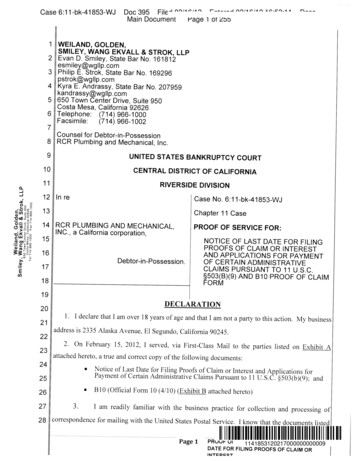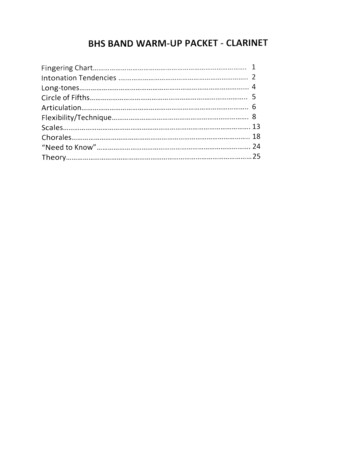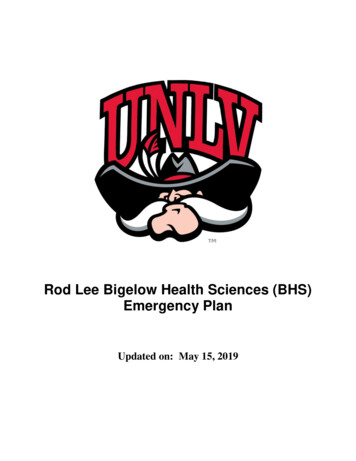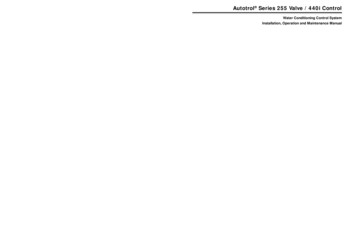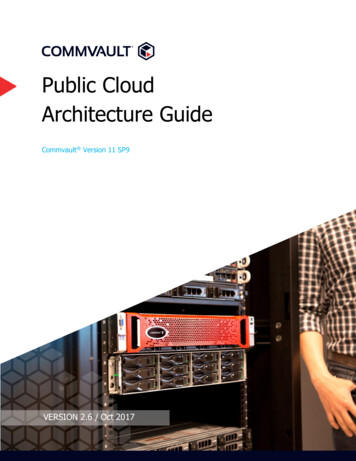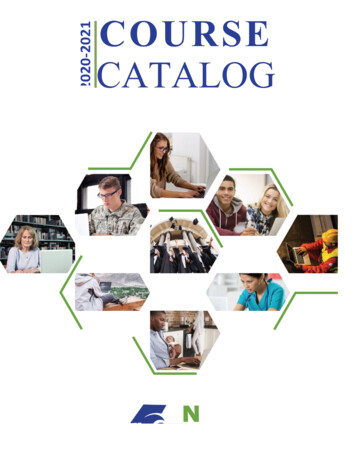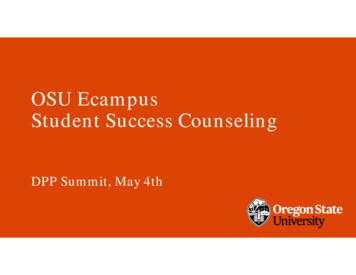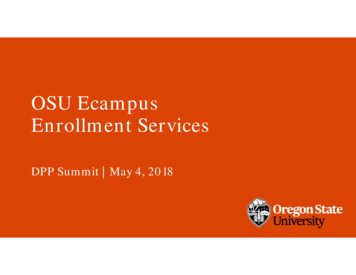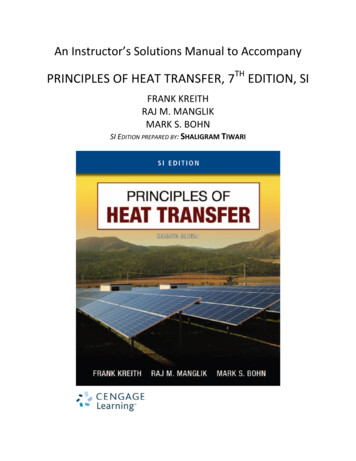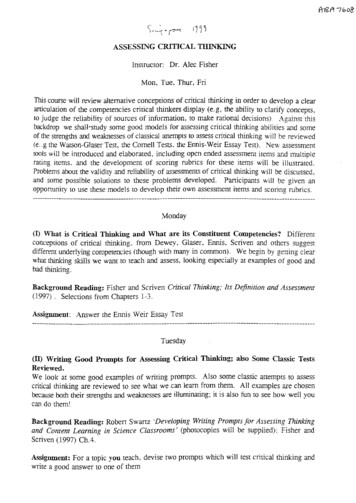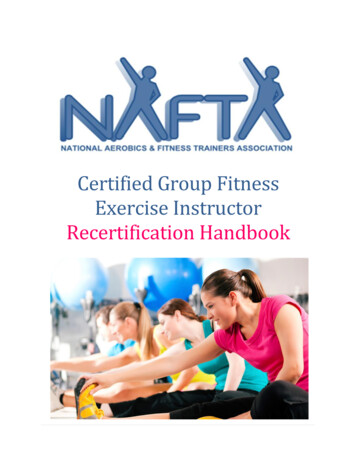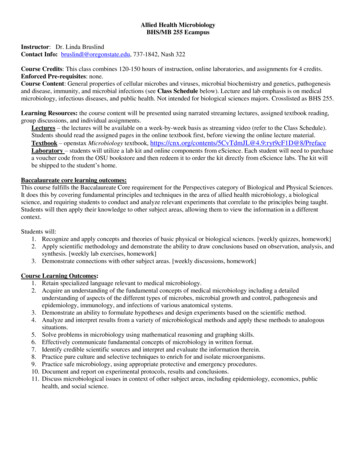
Transcription
Allied Health MicrobiologyBHS/MB 255 EcampusInstructor: Dr. Linda BruslindContact Info: bruslindl@oregonstate.edu, 737-1842, Nash 322Course Credits: This class combines 120-150 hours of instruction, online laboratories, and assignments for 4 credits.Enforced Pre-requisites: none.Course Content: General properties of cellular microbes and viruses, microbial biochemistry and genetics, pathogenesisand disease, immunity, and microbial infections (see Class Schedule below). Lecture and lab emphasis is on medicalmicrobiology, infectious diseases, and public health. Not intended for biological sciences majors. Crosslisted as BHS 255.Learning Resources: the course content will be presented using narrated streaming lectures, assigned textbook reading,group discussions, and individual assignments.Lectures – the lectures will be available on a week-by-week basis as streaming video (refer to the Class Schedule).Students should read the assigned pages in the online textbook first, before viewing the online lecture material.Textbook – openstax Microbiology textbook, refaceLaboratory – students will utilize a lab kit and online components from eScience. Each student will need to purchasea voucher code from the OSU bookstore and then redeem it to order the kit directly from eScience labs. The kit willbe shipped to the student’s home.Baccalaureate core learning outcomes:This course fulfills the Baccalaureate Core requirement for the Perspectives category of Biological and Physical Sciences.It does this by covering fundamental principles and techniques in the area of allied health microbiology, a biologicalscience, and requiring students to conduct and analyze relevant experiments that correlate to the principles being taught.Students will then apply their knowledge to other subject areas, allowing them to view the information in a differentcontext.Students will:1. Recognize and apply concepts and theories of basic physical or biological sciences. [weekly quizzes, homework]2. Apply scientific methodology and demonstrate the ability to draw conclusions based on observation, analysis, andsynthesis. [weekly lab exercises, homework]3. Demonstrate connections with other subject areas. [weekly discussions, homework]Course Learning Outcomes:1. Retain specialized language relevant to medical microbiology.2. Acquire an understanding of the fundamental concepts of medical microbiology including a detailedunderstanding of aspects of the different types of microbes, microbial growth and control, pathogenesis andepidemiology, immunology, and infections of various anatomical systems.3. Demonstrate an ability to formulate hypotheses and design experiments based on the scientific method.4. Analyze and interpret results from a variety of microbiological methods and apply these methods to analogoussituations.5. Solve problems in microbiology using mathematical reasoning and graphing skills.6. Effectively communicate fundamental concepts of microbiology in written format.7. Identify credible scientific sources and interpret and evaluate the information therein.8. Practice pure culture and selective techniques to enrich for and isolate microorganisms.9. Practice safe microbiology, using appropriate protective and emergency procedures.10. Document and report on experimental protocols, results and conclusions.11. Discuss microbiological issues in context of other subject areas, including epidemiology, economics, publichealth, and social science.
GRADING:Midterm IMidterm IIFinal ExamGet Acquainted ActivityQuizzes (10)Homework (3)Discussions (10)Laboratory (10 exercises)TOTAL75 pts.75 pts.75 pts.4 pts.26 pts.30 pts.40 pts.150 pts.475 ptsFinal grades are assigned on a straight percentage basis: A 93-100%; A- 90-92%; B 87-89%; B 83-86%; B- 80-82%; C 77-79%; C 73-76%; C- 70-72%; D 67-69%; D 63-66%; D- 60-62%; 60% F. Incompletes(I) will not be given except in extraordinary circumstances. If you choose S/U grading, you need to get 70% (C-) to getan “S.” Election of S/U grading should be known only to the student and their academic advisor.Pre/Post Assessment (5 pts extra credit) – In order to gain rudimentary information about what students are learning inthe course, a pre- and post-assessment of 10 multiple choice questions will be offered. A student will receive 2.5 ptsextra credit for participating in each. Credit is based on participation, not score. The activity is designed to be closed note,closed book, no web, no outside sources at all, and based on independent performance. Both tests will be available onCanvas.Get Acquainted Activity (4 pts total) – In order to earn the 4 points for this activity students must participate in the getacquainted activity posted on Canvas, following the instructions listed. No make-ups for missing the assignment will begiven.Weekly Quizzes (3 pts each, 26 pts total) – Each quiz is worth 3 points and will cover material from the textbook chaptersassigned each week (equivalent to 1 or 2 textbook chapters). The lowest 2 quiz scores for each student will be dropped.These quizzes are designed as closed book, closed note with a limited time period (5 min.) and must be completedwithin the time period, once opened. Do not start each quiz until you have read the assigned chapters for the week andfeel adequately prepared. Quizzes will auto-submit once time has expired or the due date has been reached. Re-takesare not allowed.Group Discussions (4 pts each, 40 pts total) – Students are expected to participate in ten graded discussions. Each studentwill need to post twice for each discussion, by the deadlines listed, following the detailed instructions posted on Canvas.Homework (10 pts each, 30 pts total) – Students are expected to submit all 3 homework assignments, by the deadlineindicated. Assignments will be posted on Canvas.Exams (100 pts each, 300 pts total) – Students are expected to take all three exams, as indicated on the syllabus. Eachexam will cover one unit of information, as dictated on the Class Schedule. The final exam is not cumulative, and none ofthe exam scores are dropped, replaced or averaged. Students will be given 50 minutes for each midterm and 110 minutesfor the final exam (per University regulations). Students will have three days in which to take each exam. Exams willauto-submit once time has expired or the due date has been reached. Re-takes are not allowed.This course requires that students take exams under the supervision of an approved proctor, which may involvean additional fee. It is the responsibility of the student to schedule a proctor ahead of time. If this will cause hardship,please drop the course before 11:55 pm PST on Sunday, October 1 to avoid tuition charges. It is important to submitproctoring requests as early as possible to avoid delays, with a recommendation of at least 2 weeks before each exam.Proctoring guidelines and registration for proctored exams are available online through the Ecampus testing andproctoring website g/ ) or contact Ecampus via phone: 541-7379204/1-800-667-1465. Additional details about scheduling a proctor can be found on Canvas in the Start Here module.Laboratory (100 pts) – the course will utilize a variety of experiments, both hands on and online. Many of theexperiments will utilize materials/resources from eScience. It is important that students follow the directions and safetyinstructions provided. Other lab exercises will be conducted using online resources freely available through a variety ofsites (see Laboratory Schedule below).
Course Policies: Class information: (i.e. narrated lectures, homework instructions/links, quizzes) are posted on Canvas atLearn@oregonstate.edu in weekly modules. Students must have an operational ONID account to access classmaterial. Correspondence: email correspondence with the instructor must be respectful in nature and tone, withtransparency as to sender. Exams (midterm I, midterm II, final exam) are only available through a proctor. Proctoring guidelines andregistration for proctored exams are available online through the Ecampus testing and proctoring octoring/ ) or contact Ecampus via phone: 541-737-9204/1-800667-1465. Additional details about scheduling a proctor can be found on Canvas. Quizzes are available online though Canvas, on the dates indicated. No late quizzes are accepted. Correct answersfor the quiz questions will be revealed once the quiz deadline has passed. Grading: It is the student’s responsibility to carefully examine all graded papers upon return. Students have oneweek to contest a score, from the time of the posting of a score. Any grade adjustments made after this period areat the instructor’s discretion. Late work:o No make-up is given for the Get Acquainted Activity. Student must post an appropriate submission by thedeadline listed.o No make-up is given for exams, quizzes, or homework assignments not taken within the specified timeperiod. Exams, quizzes, and homework assignments must be completed by the deadline listed.o No make-up is given for discussion points, once the deadline indicated as passed.Link to Statement of Expectations for Student tudentlife.oregonstate.edu/files/code of student conduct.pdfStatement Regarding Students with Disabilities:Accommodations for students with disabilities are determined and approved by Disability Access Services (DAS). If you,as a student, believe you are eligible for accommodations but have not obtained approval please contact DAS immediatelyat 541-737-4098 or at http://ds.oregonstate.edu. DAS notifies students and faculty members of approved academicaccommodations and coordinates implementation of those accommodations. While not required, students and facultymembers are encouraged to discuss details of the implementation of individual accommodations.
BHS/MB 255 Lecture ScheduleRequired Texts: openstax Microbiology textbook, refaceThe lectures are available as streaming media on Canvas.Unit Week Lecture TopicsReadingLearning ActivitiesAssignmentsExtra CreditPre-Assessment111An Invisible WorldChapter 1Quiz 12The CellChapter 3Discussion 1233456Prokaryotic DiversityThe Eukaryotics of MicrobiologyAcellular PathogensMicrobial Biochemistry78Microbial GrowthMicrobial GeneticsChapter 4Chapter 5Chapter 6Chapter 7:Section 7.5Chapter 9Chapter 12:Section 12.4Quiz 2Discussion 2Quiz 3Discussion 3Homework 124910511612131471516Midterm IControl of Microbial GrowthChapter 13Antimicrobial DrugsChapter 14Microbial Mechanisms ofPathogenicityDisease and EpidemiologyInnate Nonspecific Host DefensesAdaptive Specific Host DefensesChapter 15Diseases of the Immune SystemLaboratory Analysis of the ImmuneResponseChapter 19Chapter 20Chapter 16Chapter 17Chapter 18Quiz 4Discussion 4Quiz 5Discussion 5Quiz 6Discussion 6Homework 6Quiz 7Discussion 7Homework 2381718Midterm IISkin and Eye InfectionsChapter 21Respiratory System InfectionsChapter 22Quiz 8Discussion 891920Urogenital InfectionsDigestive System InfectionsChapter 23Chapter 24Quiz 9Discussion 91021Circulatory and Lymphatic SystemInfectionsNervous System InfectionsChapter 25Quiz 10Discussion 1022Chapter 26Homework 3Extra CreditPost AssessmentFinal Exam
BHS/MB 255 Laboratory ScheduleWeek123TopicIntroduction to ScienceMicrobiology Lab SafetyMicroscopy and Staining4Culturing and AsepticTechnique5Growth ofMicroorganisms6Selective Media and Agar78Antibiotic SensitivityThe Immune System:Friend and FoeCase Studies inMicroscopyCase Studies inMicrobiology910Lab ActivityDesign an ExperimentImportance of Hand HygieneVirtual Magnification ExerciseVirtual MicroscopeGram StainingAgar Plate Preparation and BacterialInoculationBacterial Transfer to a Stab Tube and anAgar PlateFluid Thioglycollate MediumEffect of Chemical Germicides on BacterialGrowthSelection and Differentiation of BodyInhabiting, Gram-Positive BacteriaSelection and Differentiation of GramNegative Bacteria from Liquid SamplesKirby-Bauer disk diffusion testImmunology Virtual LabSourceeScience lab kiteScience lab kiteScience lab kitVirtual Interactive BacteriologyLaboratory or Virtual LabseScience lab kitThe Fatal Flu, Battle of the Biofilms,Middle Ear Mayhem, or Aches on a PlaneSalem’s Secrets: A Case Study onHypothesis Testing and Data AnalysisCornell siteeScience lab kiteScience lab kiteScience lab kithhmi BioInteractiveNational Center for Case StudyTeaching in Science
Allied Health Microbiology BHS/MB 255 Ecampus Instructor: Dr. Linda Bruslind Contact Info: bruslindl@oregonstate.edu, 737-1842, Nash 322 Course Credits: This class combines 120-150 hours of instruction, online laboratories, and assignments for 4 credits. Enforced Pre-requisites: none. Course Content: General properties of cellular micr
